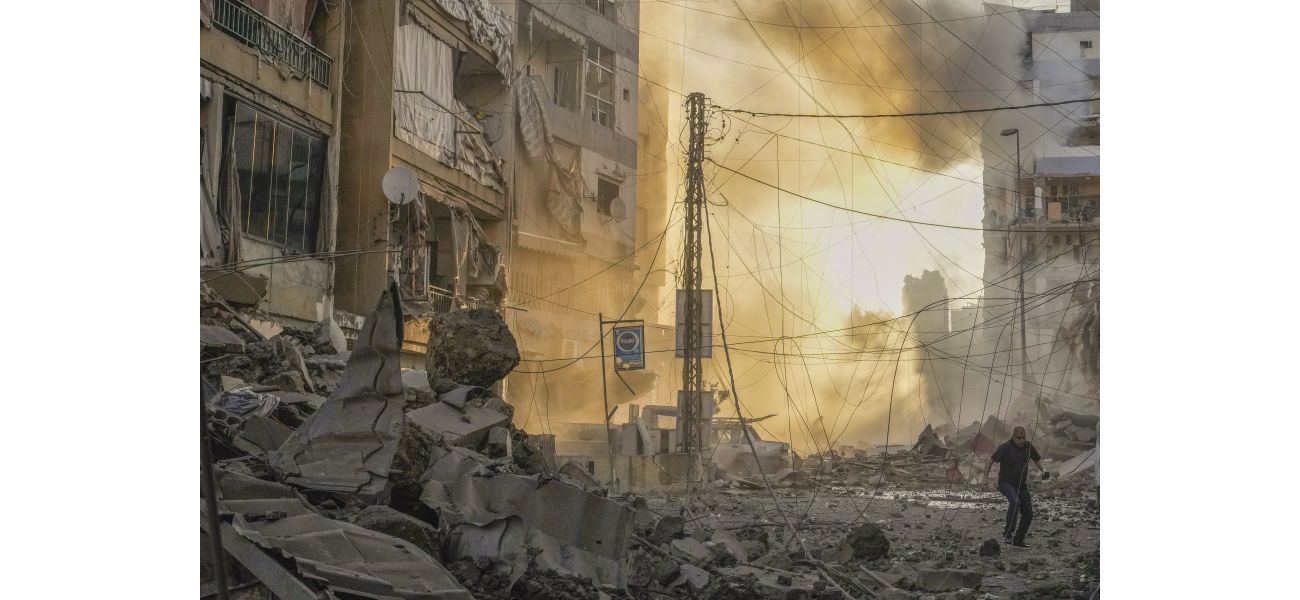The bombing of Beirut by Israel has disrupted an important passage into Syria.
Israel launched large-scale air attacks, targeting Beirut suburbs and blocking the main border crossing used by thousands of people escaping the bombing.
October 4th 2024.

In the midst of ongoing conflict, Israel has launched a series of airstrikes targeting the southern suburbs of Beirut. This has resulted in the closure of the main border crossing between Lebanon and Syria, leaving tens of thousands of people stranded as they attempt to flee the intense bombardment.
The airstrikes in Beirut's southern suburbs were powerful enough to send massive plumes of smoke and flames into the night sky, shaking buildings in the Lebanese capital. However, the Israeli military has not disclosed the intended target of these strikes and there is currently no information available on potential casualties. The Lebanese state-run National News Agency has reported over 10 consecutive airstrikes in the area.
Meanwhile, Israel's military has stated that the militant group Hezbollah launched roughly 100 rockets into Israel in retaliation on Friday. This comes as the fighting between the two sides continues to escalate.
In a statement, the Israeli military revealed that Mohammed Rashid Skafi, the head of Hezbollah's communications division, was killed in a strike on Thursday in Beirut. Skafi was described as a senior Hezbollah terrorist who had been in charge of the communications unit since 2000 and had close ties to high-ranking officials within the group.
The strike that occurred on the Lebanon-Syria border, approximately 50 kilometers east of Beirut, resulted in the closure of the road near the busy Masnaa Border Crossing. Israel claims this crossing was being used by Hezbollah to smuggle military equipment from Iran and other proxies into Lebanon. Fighter jets were reportedly targeting a tunnel used for this purpose.
Hezbollah is believed to receive much of its weaponry from Iran through Syria. The group has a presence on both sides of the border and has been supporting Syrian President Bashar Assad's forces in the ongoing conflict.
Video footage from the Associated Press showed two large craters on either side of the road, preventing cars from passing and forcing people to cross on foot with their belongings. Thousands of people have fled to Syria in the past two weeks to escape the war in Lebanon.
These recent airstrikes were launched after Israel warned residents in southern Lebanon, including those living beyond the United Nations-declared buffer zone, to evacuate. This buffer zone was established after the month-long war between Israel and Hezbollah in 2006.
Since Tuesday, Israel has been conducting a ground incursion into Lebanon, engaging in clashes with Hezbollah militants in a narrow strip along the border. Prior to this incursion, a series of attacks had already resulted in the deaths of several key members of the militant group, including their long-time leader Hassan Nasrallah.
Iran's Foreign Minister Abbas Araghchi arrived in Beirut on Friday for meetings with Lebanese officials. He warned that if Israel were to attack Iran, they would retaliate with even greater force. Araghchi's visit came just three days after Iran launched over 180 missiles into Israel, escalating tensions in the region.
In Tehran, the country's Supreme Leader Ayatollah Ali Khamenei delivered a speech during Friday prayers, praising Iran's recent missile strike on Israel. He also stated that Iran is prepared to launch further attacks if necessary. Khamenei addressed thousands of people at the Mosalla mosque, which was adorned with a large Palestinian flag.
This recent strike at the main border crossing marks the first time it has been closed since the start of the war. According to the Lebanese General Security, over 250,000 Syrian citizens and 82,000 Lebanese citizens have crossed into Syrian territory since Israel began heavily bombing southern and eastern Lebanon on September 23.
While there are multiple border crossings between Lebanon and Syria that remain open, the Lebanese minister of public works has stated that all crossings are under the supervision of the state.
The violence between Israel and Hezbollah has resulted in almost daily exchanges of fire across the southern border of Lebanon since Hamas' cross-border attack in October 2023. This attack resulted in the death of 1,200 Israelis and the hostage-taking of 250 others.
In addition to the ongoing conflict with Hezbollah, Israel has also carried out a strike in the occupied West Bank in coordination with the Shin Bet internal security service. The Palestinian Health Ministry reported that 18 people were killed in this strike on a refugee camp in Tulkarem.
Since the start of the Israel-Hamas war in October 2023, violence has spread throughout the occupied territory, particularly in cities like Tulkarem. Israel declared war on Hamas in response to their attack, resulting in the deaths of over 41,000 Palestinians, with more than half being women and children. In Lebanon, almost 2,000 people have been killed, with the majority of deaths occurring since September 23.
On Friday, Israel's military reported that militants in Gaza fired two rockets into Israeli territory, marking the first rocket fire from Gaza in approximately a month. One of the rockets was intercepted by Israel's Iron Dome missile defense system, while the other landed in an open area near a kibbutz on the border of Gaza. The frequency of rocket fire from Gaza has decreased significantly since the start of the war.
The airstrikes in Beirut's southern suburbs were powerful enough to send massive plumes of smoke and flames into the night sky, shaking buildings in the Lebanese capital. However, the Israeli military has not disclosed the intended target of these strikes and there is currently no information available on potential casualties. The Lebanese state-run National News Agency has reported over 10 consecutive airstrikes in the area.
Meanwhile, Israel's military has stated that the militant group Hezbollah launched roughly 100 rockets into Israel in retaliation on Friday. This comes as the fighting between the two sides continues to escalate.
In a statement, the Israeli military revealed that Mohammed Rashid Skafi, the head of Hezbollah's communications division, was killed in a strike on Thursday in Beirut. Skafi was described as a senior Hezbollah terrorist who had been in charge of the communications unit since 2000 and had close ties to high-ranking officials within the group.
The strike that occurred on the Lebanon-Syria border, approximately 50 kilometers east of Beirut, resulted in the closure of the road near the busy Masnaa Border Crossing. Israel claims this crossing was being used by Hezbollah to smuggle military equipment from Iran and other proxies into Lebanon. Fighter jets were reportedly targeting a tunnel used for this purpose.
Hezbollah is believed to receive much of its weaponry from Iran through Syria. The group has a presence on both sides of the border and has been supporting Syrian President Bashar Assad's forces in the ongoing conflict.
Video footage from the Associated Press showed two large craters on either side of the road, preventing cars from passing and forcing people to cross on foot with their belongings. Thousands of people have fled to Syria in the past two weeks to escape the war in Lebanon.
These recent airstrikes were launched after Israel warned residents in southern Lebanon, including those living beyond the United Nations-declared buffer zone, to evacuate. This buffer zone was established after the month-long war between Israel and Hezbollah in 2006.
Since Tuesday, Israel has been conducting a ground incursion into Lebanon, engaging in clashes with Hezbollah militants in a narrow strip along the border. Prior to this incursion, a series of attacks had already resulted in the deaths of several key members of the militant group, including their long-time leader Hassan Nasrallah.
Iran's Foreign Minister Abbas Araghchi arrived in Beirut on Friday for meetings with Lebanese officials. He warned that if Israel were to attack Iran, they would retaliate with even greater force. Araghchi's visit came just three days after Iran launched over 180 missiles into Israel, escalating tensions in the region.
In Tehran, the country's Supreme Leader Ayatollah Ali Khamenei delivered a speech during Friday prayers, praising Iran's recent missile strike on Israel. He also stated that Iran is prepared to launch further attacks if necessary. Khamenei addressed thousands of people at the Mosalla mosque, which was adorned with a large Palestinian flag.
This recent strike at the main border crossing marks the first time it has been closed since the start of the war. According to the Lebanese General Security, over 250,000 Syrian citizens and 82,000 Lebanese citizens have crossed into Syrian territory since Israel began heavily bombing southern and eastern Lebanon on September 23.
While there are multiple border crossings between Lebanon and Syria that remain open, the Lebanese minister of public works has stated that all crossings are under the supervision of the state.
The violence between Israel and Hezbollah has resulted in almost daily exchanges of fire across the southern border of Lebanon since Hamas' cross-border attack in October 2023. This attack resulted in the death of 1,200 Israelis and the hostage-taking of 250 others.
In addition to the ongoing conflict with Hezbollah, Israel has also carried out a strike in the occupied West Bank in coordination with the Shin Bet internal security service. The Palestinian Health Ministry reported that 18 people were killed in this strike on a refugee camp in Tulkarem.
Since the start of the Israel-Hamas war in October 2023, violence has spread throughout the occupied territory, particularly in cities like Tulkarem. Israel declared war on Hamas in response to their attack, resulting in the deaths of over 41,000 Palestinians, with more than half being women and children. In Lebanon, almost 2,000 people have been killed, with the majority of deaths occurring since September 23.
On Friday, Israel's military reported that militants in Gaza fired two rockets into Israeli territory, marking the first rocket fire from Gaza in approximately a month. One of the rockets was intercepted by Israel's Iron Dome missile defense system, while the other landed in an open area near a kibbutz on the border of Gaza. The frequency of rocket fire from Gaza has decreased significantly since the start of the war.
[This article has been trending online recently and has been generated with AI. Your feed is customized.]
[Generative AI is experimental.]
0
0
Submit Comment





